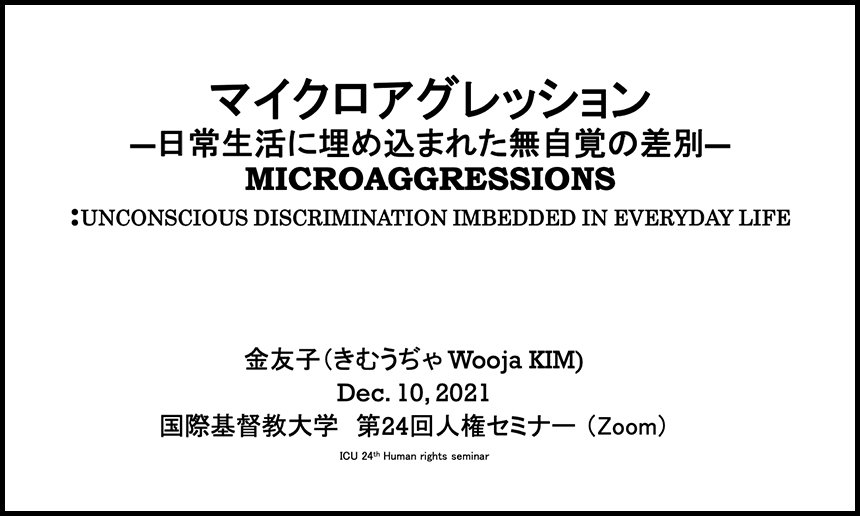NEWS
24th Human Rights Seminar "Unconscious Discrimination Embedded in Everyday Life - Microaggressions"
Update: December 20, 2021

The 24th Human Rights Seminar, entitled "Unconscious Discrimination Embedded in Everyday Life - Microaggressions" was held on Friday, December 10, 2021. This seminar is held every year sometime around "Human Rights Day" (December 10) by the ICU Human Rights Committee and Human Rights Advisory Board which conduct counseling and educational activities concerning human rights.
This year the seminar was held online with Dr. Kim Wooja as a speaker. Dr. Kim Wooja is Associate Professor of the Department of International Relations, College of International Relations, Ritsumeikan University, and a member of the Microaggression Study Group. In the seminar, specific examples were given of the environment and psychology of recipients and discriminators from the viewpoint of the keyword "microaggressions," which conceptualizes unconscious discrimination in everyday life.
Microaggression refers to verbal, behavioral, or environmental slights targeted at specific persons or groups of persons, whether intentional or unintentional, that communicate hostile, negative, or disrespectful attitudes towards a certain race, gender, sexual orientation, or religion. They are sometimes called modern discrimination in contrast to classic discrimination expressed in clear and overt ways. Microaggressions are not very visible and difficult to address by law. The recipients sometimes suffer psychological anxiety because although they feel minor aggressions on a daily basis, it is difficult to point out microaggressions as discrimination.
For example, questions and statements such as "Where do you come from?" "Where were you born?" "You must be a good soccer player because you are Brazilian" may constitute a microaggression. Since such phrases are quite common and nothing is striking about them, it may be difficult for the majority to understand what is aggressive about such expressions.
Students, faculty and staff members learned that they should be careful not to see things from their own cultural perspectives and to broaden knowledge about diverse stories. They also learned that it is effective for recipients of microaggressions to make the discriminators aware of the discrimination (mirroring) by asking "What do you mean by that?", "I felt this way," or bringing up the subject again by saying, "About what you said a few minutes ago...."
The lecture provided a valuable opportunity to spread awareness and seek solutions for microaggressions.
